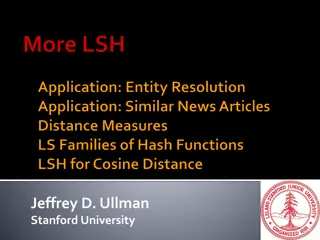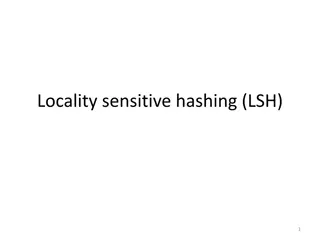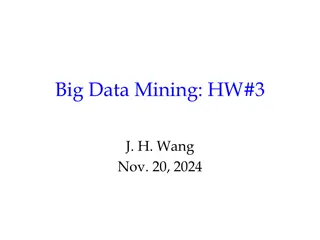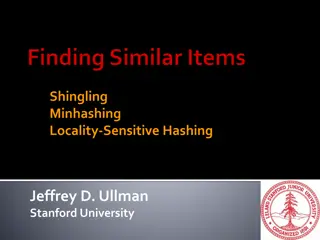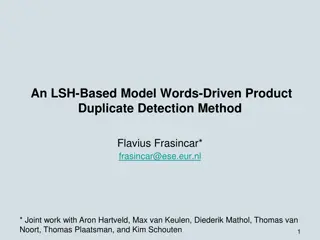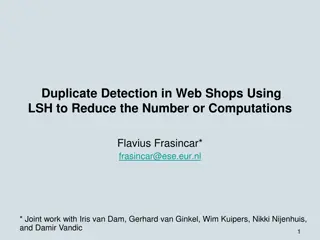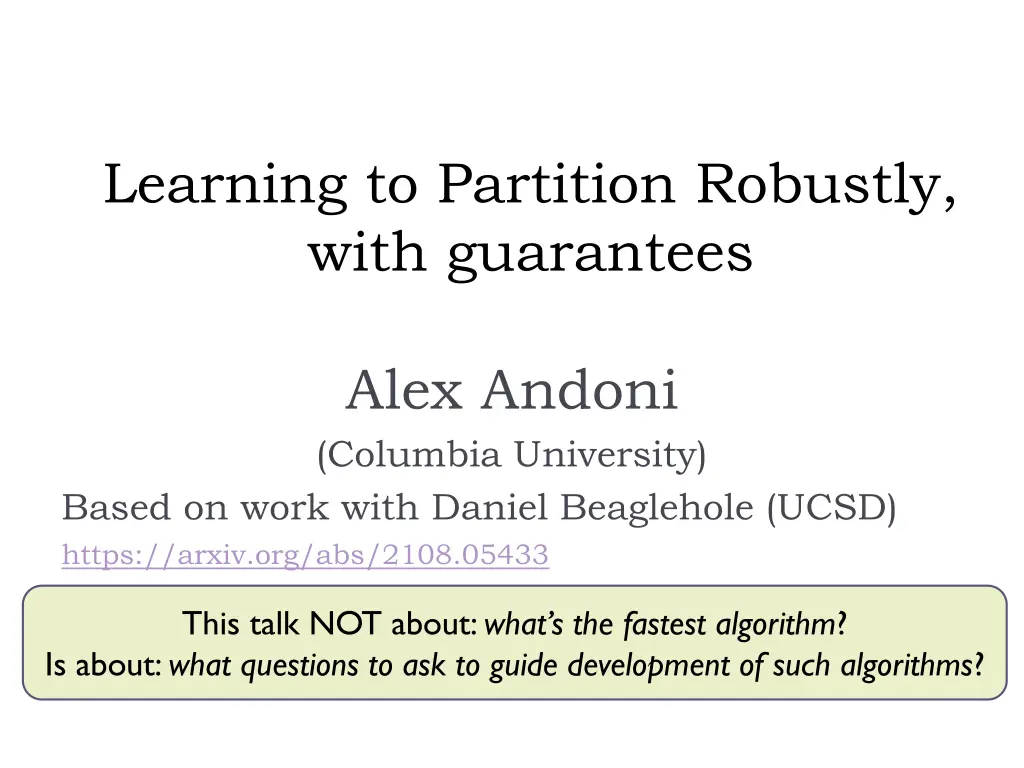
Learning to Partition Robustly with Guarantees: Insights on Algorithm Development
Dive into the world of partitioning algorithms with Alex Andoni from Columbia University. Explore strategies for robust partitioning with guarantees, focusing on the development process rather than speed. Discover key questions to shape algorithm design and enhance efficiency in nearest neighbor search, overcoming the curse of dimensionality, and leveraging approximate solutions. Uncover the role of indexing algorithms, including space partitions, locality-sensitive hashing, and data-dependent optimizations.
Download Presentation

Please find below an Image/Link to download the presentation.
The content on the website is provided AS IS for your information and personal use only. It may not be sold, licensed, or shared on other websites without obtaining consent from the author. If you encounter any issues during the download, it is possible that the publisher has removed the file from their server.
You are allowed to download the files provided on this website for personal or commercial use, subject to the condition that they are used lawfully. All files are the property of their respective owners.
The content on the website is provided AS IS for your information and personal use only. It may not be sold, licensed, or shared on other websites without obtaining consent from the author.
E N D
Presentation Transcript
Learning to Partition Robustly, with guarantees Alex Andoni (Columbia University) Based on work with Daniel Beaglehole (UCSD) https://arxiv.org/abs/2108.05433 This talk NOT about: what s the fastest algorithm? Is about: what questions to ask to guide development of such algorithms?
Nearest Neighbor Search (NNS) Preprocess: a set ? of points Query: given a query point ?, report a point ? ? with the smallest distance to ? ? ? Distances: Hamming, Euclidean (max-IP), edit distance, earthmover distance, etc 2
Curse of Dimensionality Hard when ? log? Algorithm Full indexing No indexing Query time ? log?? 1 ?(? ?) Space ??(?)(Voronoi diagram size) ?(? ?) ?0.99 ?? 1 3
Approximate NNS ?-near neighbor: given a query point ?, report a point ? ? s.t. ? ? ? as long as there is some point within distance ? with probability at least, say, 90% ?? ? ? ?? ? Use for exact NNS in practice: Filtering: gives a set of candidates, includes each near neighbor (with some prob.) ? 4
Indexing algorithms: space partitions Disclaimers: Not all are indexing: Sketch (hash) + linear scan Not all are space partitions: Graph-based [MY 18] kd-trees Performance degrades with dimension 5
Locality-Sensitive Hashing (LSH) Random space partitions: oblivious of the dataset E.g., random hyperplane, simhash [IM 98, Cha 01,DIIM 04] Guarantees: ?????[# far points in bucket] = 1 Prob. query collides with a r-near neighbor: Pr[success] ? ? Recall ? ? But stronger guarantee! Can boost to, say, 90% by taking ?? iid trees 6
LSH Algorithms Space Time Exponent Reference ? = ? Hamming space ?? [IM 98] ?1+? ? = 1/? ? = 1/2 [MNP 06, OWZ 11] ? 1/? Other space/time trade-off possible: multi-probe [LJWCL 07, ] Euclidean space ?? [IM 98, DIIM 04] ?1+? ? = 1/? ? 1/?2 ? = 1/2 [AI 06] ? = 1/4 [MNP 06, OWZ 11] ? 1/?2 7
My dataset is not worse-case vs Practice Data-dependent: optimize the partition to your dataset PCA-tree [S 91, M 01, VKD 09, ] randomized kd-trees, RP, deep-learned [SAH08, ML09, DS13,KS 18,DIRW 20, ] Quantization/clustering [JDS11, GLGP13,JDJ 17 ] spectral/semantic/WTA hashing [WTF08, CKW09, SH09, YSRL11, ] 8
Practice vs Theory Data-dependent partitions often outperform random partitions But no guarantees (correctness or performance) Hard to measure progress, understand trade-offs What s the right question to ask for the next step? Data-independent often optimal in worst-case, e.g., for dimension reduction [A 03, JW 13, AIP 06] Why do data-dependent partitions outperform random ones ? 9
How to study phenomenon: Why do data-dependent partitions outperform random ones ? Answer 1: further special structure in the dataset Intrinsic dimension is small [Cla 99,KR 02, KL 04, BKL 06, IN 07, DS 13, ,DK 21] Data generated from a model [AAKK 14, ] Answer 2: have access to distribution of the queries Recall assumes this by default Algorithms with no explicit structure assumptions? Adversarial queries? 10
Answer 3: DD helps even in worst-case! Space Time Exponent Reference ? = ? ?? [IM 98] ?1+? Hamming space ? = 1/? ? = 1/2 LSH [MNP 06, OWZ 11] ? 1/? [AINR 14,AR 15] 1 ? = 1/3 ? 2? 1 Led to FALCONN [AILRS 15], also FlyLSH [DSN 17] although only the data-independent part Euclidean space ?? [AI 06] ?1+? ? 1/?2 ? 1/?2 ? = 1/4 LSH [MNP 06, OWZ 11] [AINR 14, AR 15] 1 ? = 1/7 ? 2?2 1 11
Data-dependent LSH A random space partition, chosen after seeing the given dataset Efficiently computable Ingredient is a regularity lemma : Can always decompose a data- set into random-looking data-set, plus a few clusters 12
Answer 4: Instance optimality? Goal: best possible algorithm for the given dataset Guaranteed worst-case performance, but better performance for nicer dataset Focused goal: Best possible in a class: here, tree-based space partition Quality measure: here, Pr[success] of worst-case query Alternative: average Pr (if we know the query distribution) = Recall [AB 21]: for Hamming space Class = bit sampling/coordinate cut Includes optimal worst-case LSH [IM 98], minhash [Bro 97,BGMZ 97] coor 3 coor 5 coor 2 13
Instance Optimal LSH for Hamming Issue: cannot choose best tree ! Always exists (adversarial) query that fails Need to find best distribution over trees Overall, can formulate as for fixed dataset ?: (?) = max min?Pr where ? ranges over ?-near neighbors of all ? ? and over distributions of trees Construction inductive: Find the distribution for the root Sample one partition And then recurse on both parts ? [? ??? ? collide in T] ? = 00010110 ? = 00110110 coor 3 coor 5 coor 2 14 coor 7
Finding optimal distribution of split coor ? The question at the root: Find distribution ? over [?] that maximizes ? = ??] (?) = max min ? ?? ?[??= ??] Pr[??????? ?? ? :?? ? ?=1 where ? ranges over all ?-near neighbors of all ? ? Issue 1: we don t know Ok to lower bound => will obtain a lower bound on overall Pr Natural LB candidate: if we were to do random partition! Issue 2: how to solve exponential number of ? s ? 2-player minimax game Need to solve for fixed ?: runtime ?? Number of iterations: ???? ? /?2 for ? additive error (? ) 15
Results Can sample a data-dependent tree with: Pr ??????? ?? for every query, ? = 1/?opt LSH [IM 98] How to evaluate it s better than vanilla LSH? Ideally, would say that it s the best possible in class Our algorithm develops a lower bound on Pr only: Instead, show for a mixture model (2 random clusters) In experiments, improved the average Pr[success] as well Heatmaps for ? at the root (MNIST, ? = 5/6 and ) 16
Finale: data-dependent space partitions How can we study data-dependent algorithms? Optimizing the worst-case query Design instance optimal algorithms? Best in a class which class? The wider the better Euclidean, with hyperplane partitions? a priori hard since we can t even write down a distribution ? over all hyperplanes! Hope 1: embeds into 1 (=> optimizing over ~? random hp) Hope 2: we need only a sample from the distribution Better estimate/lower bound for recursive Pr[success]? In our algorithm, we need to plug-in ? ? as a lower bound Lifting all the queries Captures simhash, PCA-, RP- trees 17

